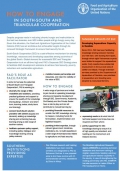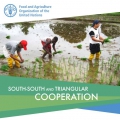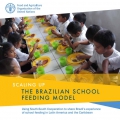Documents

09 Mar 2017
South-South Cooperation (SSC) is playing a greater role than ever before in the development cooperation landscape. Innovation in the global South is generating new tools and partnerships for tackling issues of food insecurity, poverty reduction and sustainable agriculture. The South offers wide-ranging development solutions – knowledge, experiences and good practices, innovative policies, technology, know-how, and resources – that have proven costeffective and have huge potential to be shared, adapted and adopted.
The strategy is a response to growing demand from member countries to benefit from experiences of other Southern countries. It was adopted in 2013 after extensive consultations with national governments,...
12 Sep 2016
يساعد الدليل القارىء على كيفية الانخراط خطوة خطوة في التعاون فيما بين بلدان الجنوب كأداة مكملة للتعاون بين الشمال والجنوب، كوسيلة لتنفيذ ولاية المنظمة وتحقيق أهداف التنمية المستدامة. كما يوفر الأدوات اللازمة لتسليط الضوء على البلدان المشاركة في التعاون بين بلدان الجنوب، فضلا عن تشجيع الآخرين الذين لديهم ما يقدم.
08 Mar 2016
South-South Cooperation (SSC) is a cost-effective mechanism for sharing knowledge, resources and developing capacities among countries of the global South. Global demand for successful SSC and Triangular Cooperation is at an all-time high and FAO’s Corporate SSC Strategy aims to facilitate SSC development solutions to achieve food security, poverty reduction and sustainable agriculture.
17 Sep 2015
There is a growing consensus around the world, affirming South-South and Triangular Cooperation as effective instruments for catalyzing agricultural development. South-South Cooperation (SSC) is widely accepted as a complementary model of development cooperation to the traditional NorthSouth model, in overcoming common challenges and achieving food security, poverty reduction and the sustainable management of natural resources.
15 Jun 2015
Brazil has made tremendous progress in reducing malnutrition. In 1990, 14.8 percent of the population suffered from hunger; the figure is now just 1.7 percent. This remarkable transformation owes much to the country’s school feeding programme. By 2014, the programme was supplying approximately 43 million pupils with one or more servings of food per day, in almost 250 000 schools across the country. By Brazilian law, at least 30 percent of the food must be sourced from family farms, thus providing significant benefits to over 120 000 rural families. 